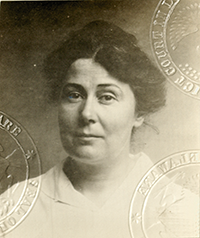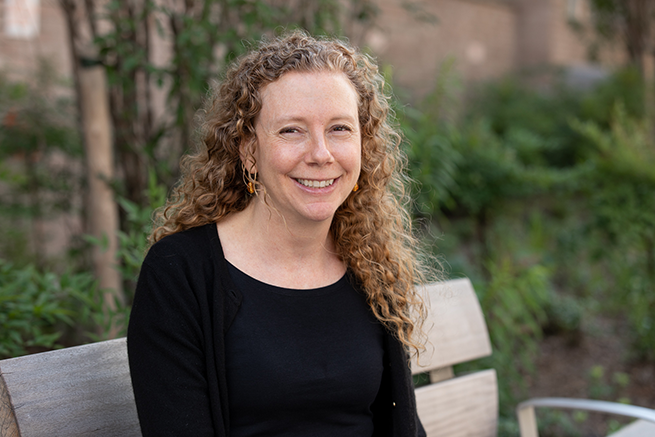Although she is now all but forgotten, Ellen N. La Motte was quite possibly America’s

most extraordinary nurse leader of the early 20th century. Born in 1873 (the year the first nursing school was founded in the United States), she was a trained nurse, expert in the field of tuberculosis treatment, groundbreaking public health administrator, suffragist, socialist, self-proclaimed anarchist, lesbian (partnered with a prominent American heiress and art-collector for over 45 years), relentless leader of an international anti-opium crusade, and much more.
But all I knew about Ellen when I started researching her years ago was that she served as a nurse during World War I in a frontline French field hospital on the Western Front and that she wrote a uniquely unsettling and absolutely astounding collection of short stories,
The Backwash of War: The Human Wreckage of the Battlefield as Witnessed by an American Hospital Nurse.
The Backwash of War
Contemporary readers called the book “immortal” and “the most remarkable picture of war horrors ever penned.” The very first review, in
Publisher’s Weekly, stated, “Miss La Motte has seen horror with a big H, raw, gaunt, grisly Horror, a great human shambles working overtime.” The reviewer elaborated: “She doesn’t use pretty or

conventional words to describe it, and after reading the book we comfortable stay-at-homes must realize, if we have not already, the fatuity of seeking pretty or nice terms to describe this stupendous mess, Modern War.”
Rather than romanticize war and warriors as other writers did, Ellen candidly depicted what she had witnessed. As she explains midway through the work, “Well, there are many people to write you of the noble side, the heroic side, the exalted side of war. I must write you of what I have seen, the other side, the backwash.”
The Backwash of War was published in September 1916 and immediately banned in wartime England and France. However, in America, which had not yet entered the war, the book circulated freely, received high praise, and went through multiple printings. Then in late summer of 1918 it was suddenly censored in the United States, deemed damaging to wartime morale, and it quickly slid into literary oblivion.
A new style of war writing
Long forgotten, the book is a seminal work of war writing, unlike any other published by an American wartime writer. In her barbed tales, brilliantly infused with dark humor, Ellen boldly focused on the war’s horrors rather than its heroes. In doing so, she modeled a new style of war writing that would be echoed in the works of Ernest Hemingway and legions of other war writers.
In a passage in the story titled “A Belgian Civilian” for example, she described the arrival of an unusually young patient at the field hospital:
A Belgian civilian, aged ten. Or thereabouts. Shot through the abdomen, or thereabouts. And dying, obviously. As usual, the surgeon pulled and twisted the long, black hairs on his hairy, bare arms, while he considered what he should do. He considered for five minutes, and then ordered the child to the operating room, and scrubbed and scrubbed his hands and his hairy arms, preparatory to a major operation. For the Belgian civilian, aged ten, had been shot through the abdomen by a German shell, or piece of shell, and there was nothing to do but try to remove it. It was a hopeless case, anyhow. The child would die without an operation, or he would die during the operation, or he would die after the operation.
Here as elsewhere, Ellen deftly strings together declarative sentences, and lets the underlying horror speak for itself. Meanwhile, she makes painfully clear that not just soldiers fall victim to war.
Faced with the tremendous devastation and futility of the war, and surrounded by wards of mangled men, the nurse narrator of Ellen’s stories struggles with her moral duty. Where does her true responsibility to her patients lie? Should she help mend soldiers so that they can be returned to fight again in the trenches? Will doing so make her complicit in war’s destructive process?
Tracing Ellen’s remarkable life

The Backwash of War is an unforgettable work. And when I first read it in the early 1990s, I could not understand how it had been so long forgotten. I tried to learn more about its author, but I could find very little information about Ellen beyond that contained in her New York Times obituary. When I returned to the book decades later, there still was very little published about her. But I was determined to learn more.
Searching through archives, old newspapers, and private collections, I slowly traced the outline of her life, from her teenage years in the household of her wealthy cousin Alfred I. duPont—a leading innovator of military munitions—through her time at Johns Hopkins Training School for Nurses, her years as a tuberculosis field nurse in Baltimore, and her groundbreaking appointment in 1910 as the first woman to head a division of the city’s department of health.
I also was fascinated to discover the prominent role Ellen played as a suffragist. She tirelessly fought for the vote in Maryland and even led a major suffrage parade in Baltimore during the Democratic convention of 1912. Then in 1913 she left her job and joined England’s militant suffragettes. Along the way she declared herself first a socialist and later an anarchist, and two months after arriving in London, she reported that she already had “been through four fights and one riot (and not always in the capacity of an innocent bystander).”
As I pursued my research, I discovered that Ellen was also a prolific writer, deeply engaged with public health issues, and an early and regular contributor to the American Journal of Nursing, among other publications. In speeches and essays, she argued for a new approach to treating tubercular patients and even published a highly-regarded textbook on the topic, The Tuberculosis Nurse, which was hailed as an “excellent” and “masterly” work.
When war broke out, Ellen initially volunteered at an American-sponsored hospital in Paris. And during that first winter of the war, she forged a deep and abiding friendship with Gertrude Stein, a modernist American writer, whose highly-experimental writing style likely influenced Ellen’s style in The Backwash of War. That same winter in Paris, she also began an enduring relationship with Emily Crane Chadbourne, a divorced heiress from Chicago.
Then, after nursing for several long stretches at the field hospital on the Western Front, between June 1915 and June 1916, and completing The Backwash of War, Ellen spent a year traveling with Emily in Asia.
Ellen’s anti-opium campaign
The trip sparked Ellen’s profound outrage about the opium trade. England and other colonial powers, she realized, were forcing the cultivation, manufacture, and sale of opium in their colonies, while severely restricting its use at home.
Between 1919 and her retirement from public life in 1934, Ellen wrote six books and dozens of articles about the evils of colonialism and the opium trade and spearheaded an international anti-opium campaign. In 1928, she was described by a Congressman as “the best informed woman in the world on the opium question.” Yet she faced powerful opposition. As she explained, “The drug traffic dies hard. Vast financial interests, both of nations and of individuals, are at stake.”
As we now face our own opioid epidemic, driven by corporate greed and a lack of government oversight, Ellen’s anti-opium crusade seems all too relevant and her words hauntingly prescient.
An extraordinary nurse leader
In short, I had set out to learn about an incredible war writer and discovered an incredible nurse leader. From reducing Baltimore’s mortality rate from tuberculosis, to boldly exposing the horrible scourge of war, to trying to end the opium epidemic of her day, Ellen was an extraordinary trailblazer. Likewise, in her determination to challenge firmly entrenched norms—as a socialite-turned-socialist, suffragist, and lesbian—she was far ahead of her times.
In an essay in the Atlantic Monthly that appeared soon after the publication of The Backwash of War, Ellen described being under fire at the Western Front. “The question is not whether one is afraid or not,” she wrote. “It is what one does when one is afraid that counts.” She was “not naturally what one would call brave,” or so she claimed in that essay. Nevertheless, she demonstrated tremendous bravery and not just under artillery fire.
Cynthia Wachtell is editor of The Backwash of War: An Extraordinary American Nurse in World War I, for which she wrote a comprehensive introduction and the first biography of Ellen N. La Motte. She holds a PhD in American studies from Harvard University and is a research associate professor at Yeshiva University. Learn more about La Motte and The Backwash of War at www.thebackwashofwar.com.